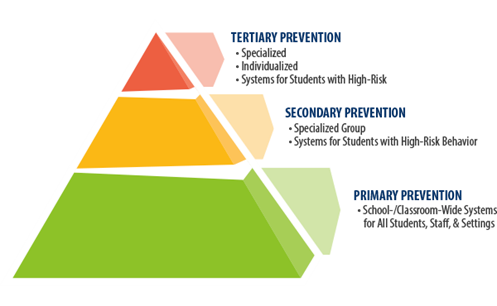Ayala, Diana (Intervention Counselor, MTSS-B)
Page Navigation
-
Multi-Tiered System of Support for Behavior (MTSS-B) Program
-
Vision
We advocate for safe and supportive school environments where all students thrive Socially, Emotionally, and Academically to become lifelong learners, responsible citizens and contributing members of their communities.
Mission
The K-12 Intervention Counseling program is dedicated to the social and emotional growth and well-being of all students through the delivery of data-driven, school-based behavioral interventions and supports that encourage the development of motivated, self-confident, and life-long learners.
Multi-Tiered Systems of Support (MTSS) for Behavior
Multi-Tiered Systems of Support is a comprehensive system, or framework, that is intended to proactively address the Academic, Behavior, Social, and Emotional needs of students.
The role of the MTSS-B counselor at the site is:
- Provide behavioral expertise to school sites
- Provide leadership in the implementation of PBIS systems
- Participate in school-site data collection to identify student needs
- Deliver data-driven, evidence-based interventions that focus on supporting students’ socio-emotional skills
- Support students and families by connecting them to community agencies
Positive Behavior Interventions and Supports (PBIS)
CVUSD is implementing Positive Behavior Interventions and Support (PBIS) to address the behavioral needs of students. PBIS is a data-driven multi-tiered approach to prevention and response of student behavior.
While every school site at CVUSD is implementing the PBIS framework in a way that meets the unique needs of their communities, there are key components that will be present throughout each school’s individual system.


Tier 1: Prevention
Goal: Provide preventative age-appropriate activities to ensure that all students within a school, regardless of language, identified needs, or socioeconomic status, develop knowledge and skills that will influence their academic achievement and their social and emotional wellbeing.
Prevention Activities
- Classroom Guidance Lessons
- School-wide assemblies & other school-wide activities
- Parent education workshops
- Staff professional development workshops
Tier 2: Focused Support
Goal: Identify systematic, data-driven interventions for students within a school that may be experiencing barriers to their academic success and/or social or emotional well-being.
Targeted Interventions
- Targeted small group, skill-based counseling
- Community referrals
- Conflict mediation
- Restorative conversations
Tier 3: Individualized Support
Goal: Provide individualized supports to students and families that may be experiencing either long-term needs or immediate circumstances that impact a student’s academic achievement and/or social or emotional well-being.
Individualized Supports
- Short-term, skill-based individual counseling
- Individualized classroom support
- Referrals to other district or outside providers
- Intervention and assistance in emergency situations or when a student is considered at imminent risk for harm
-
-
Multi-Tiered System of Support for Behavior (MTSS-B) Program
-
Vision
We advocate for safe and supportive school environments where all students thrive Socially, Emotionally, and Academically to become lifelong learners, responsible citizens and contributing members of their communities.
Mission
The K-12 Intervention Counseling program is dedicated to the social and emotional growth and well-being of all students through the delivery of data-driven, school-based behavioral interventions and supports that encourage the development of motivated, self-confident, and life-long learners.
Multi-Tiered Systems of Support (MTSS) for Behavior
Multi-Tiered Systems of Support is a comprehensive system, or framework, that is intended to proactively address the Academic, Behavior, Social, and Emotional needs of students.
The role of the MTSS-B counselor at the site is:
- Provide behavioral expertise to school sites
- Provide leadership in the implementation of PBIS systems
- Participate in school-site data collection to identify student needs
- Deliver data-driven, evidence-based interventions that focus on supporting students’ socio-emotional skills
- Support students and families by connecting them to community agencies
Positive Behavior Interventions and Supports (PBIS)
CVUSD is implementing Positive Behavior Interventions and Support (PBIS) to address the behavioral needs of students. PBIS is a data-driven multi-tiered approach to prevention and response of student behavior.
While every school site at CVUSD is implementing the PBIS framework in a way that meets the unique needs of their communities, there are key components that will be present throughout each school’s individual system.


Tier 1: Prevention
Goal: Provide preventative age-appropriate activities to ensure that all students within a school, regardless of language, identified needs, or socioeconomic status, develop knowledge and skills that will influence their academic achievement and their social and emotional wellbeing.
Prevention Activities
- Classroom Guidance Lessons
- School-wide assemblies & other school-wide activities
- Parent education workshops
- Staff professional development workshops
Tier 2: Focused Support
Goal: Identify systematic, data-driven interventions for students within a school that may be experiencing barriers to their academic success and/or social or emotional well-being.
Targeted Interventions
- Targeted small group, skill-based counseling
- Community referrals
- Conflict mediation
- Restorative conversations
Tier 3: Individualized Support
Goal: Provide individualized supports to students and families that may be experiencing either long-term needs or immediate circumstances that impact a student’s academic achievement and/or social or emotional well-being.
Individualized Supports
- Short-term, skill-based individual counseling
- Individualized classroom support
- Referrals to other district or outside providers
- Intervention and assistance in emergency situations or when a student is considered at imminent risk for harm
School Counseling Informed Consent Information
-

 CVUSD HOME
CVUSD HOME